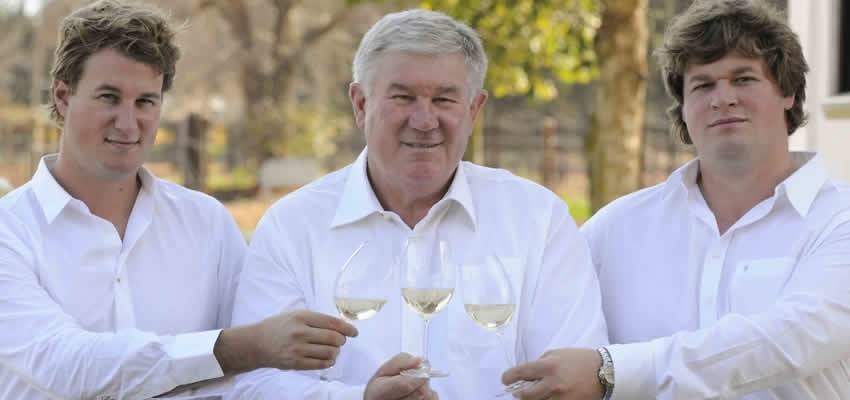Danie de Wet, who made De Wetshof the first wine estate in the Robertson Valley, inherited an ethos of conservation from his father, who bought De Wetshof in 1949.

Johann, Danie and Peter de Wet from De Wetshof in Robertson.
A philosophy of respect
Since taking ownership of the farm known as De Wetshof, three generations of the De Wet family have realised their responsibilities as custodians of a unique natural environment.
Not only because respect for and appreciation of the natural surroundings is unavoidable in these surroundings, but also because of our philosophy that the production of good wines is totally dependent on respect for the entire environment within which the vineyards are farmed and the wine is made. The latter two reasons for us being here as wine farmers would not be possible without us ensuring that plant and animal life, as well as the soils and water supplies are managed in accordance with detailed and planned environmental practices to ensure a symbiotic relationship between De Wetshof commercial endeavours and the need for conserving what we have inherited from nature.
Large parts of De Wetshof have thus been set-out solely for conservation of the local fauna and flora.
Along the river-bank as well as sets of deep ravines carved into the mountain behind De Wetshof, grey buck, duikers, hares, porcupines, snakes, mongooses, meerkats, otters, and lynx still roam. Recently the Robertson Birding Club counted 92 species in the region in one day. This astonishing diversity includes the Giant and Malachite Kingfishers, Peregrine Falcon, African Fish Eagle, Black Eagle, Paradise Flycatcher and Forktailed Drongo.
Fencing plays a big role in the management of the wildlife to ensure De Wetshof’s animals are kept within the boundaries of the property, while excluding other species of animals newly introduced into the Robertson region and which could upset the ecological balance. Fences are thus regularly maintained and repaired to ensure the harmony is maintained and not disturbed by an unwanted alien whose habits have the potential of destroying the current natural harmony.
The building of roads and tracks through De Wetshof’s property has been kept to the minimum so as to ensure the wildlife is left undisturbed and in peace.
To create an accommodating environment for the wildlife, De Wetshof has also over the past years embarked on a rigorous programme of removing alien vegetation, especially from next to the river, and planting indigenous Yellow-woods as well as thorn-trees.
Growing an 'environmental conscience'
Part of our conservation efforts include encouraging the families who live and work on De Wetshof to realise and to participate in these values. Thus, an awareness of the natural environment and the importance of preserving these wonders are instilled in the De Wetshof community from an early age.
At the De Wetshof Crèche, where pre-school and primary school children of the farm’s staff are cared for while their parents are at work. The Nature in Concert Conservation Club ensures these youngsters learn to appreciate their natural surroundings from an early age.
To ensure that this "environmental conscience" is formed at an early age, we have taken this learning to the De Wetshof farm crèche where the children are now actively encouraged to look at the natural world around them with appreciation and to cultivate an awareness of how important it is to protect the plant and animal life for the future.
Book in hand, they are encouraged to identify plant and animal species, and regular trips are undertaken away from the farm to areas in the vicinity where animals can be viewed at closer quarters. While it is great fun and the enjoyment and excitement of belonging to their very own Conservation Club has instilled a feeling of ownership, we believe that these early lessons will set the children up to become responsible adults who will lead conservation-minded lives and pass these values on to future generations.
Conserving fynbos as a WWF Conservation Champion
One of the latest initiatives on De Wetshof which caught the eye of the WWF Conservation Champions is the conservation of indigenous fynbos flowers growing between the De Wetshof vineyards.
Here the rich indigenous fynbos has become a welcome ally with wild fynbos plants left to grow between the vines, offering various viticulture benefits as well as contributing to De Wetshof’s commitment to sustainable agriculture.
"With our famous fynbos plant kingdom, we Cape wine farmers might just be sitting with the most unique cover-crops in the world," says De Wet. "The Cape fynbos incorporates a mass of wild shrubs, bushes, and flowers. Over 9 000 different species, each divided into various categories throughout the geography of the Western Cape. On De Wetshof we are committed to conserving this majestic natural occurrence – not only by putting an area of our farm aside as wild, uncultivated veld to conserve the natural environment, but to make the fynbos plants a part of our viticulture.
As the new generation of custodians on De Wetshof and the overall realisation of the importance of sustainability in the wine world, we are looking forward to continuing to embrace conservation and sustainability as an integral part of the daily life on De Wetshof."